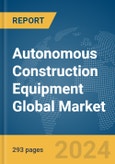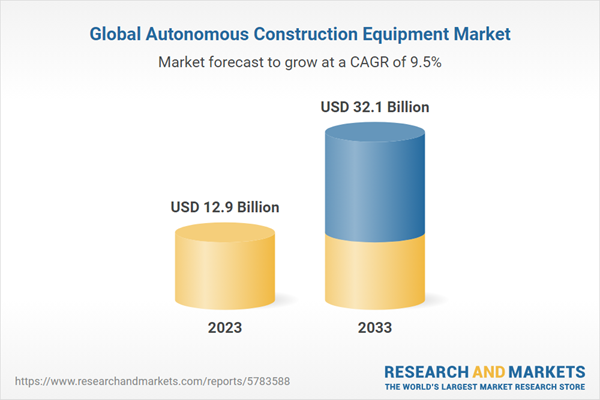The global autonomous construction equipment market reached a value of nearly $12.9 billion in 2023, having grown at a compound annual growth rate (CAGR) of 7.60% since 2018. The market is expected to grow from $12.9 billion in 2023 to $20.3 billion in 2028 at a rate of 9.45%. The market is then expected to grow at a CAGR of 9.59% from 2028 and reach $32 billion in 2033.
Growth in the historic period resulted from strong economic growth, increasing development of infrastructure and bridge construction, increased need for safety measures during construction activities. Factors that negatively affected growth in the historic period were volatility in rising construction costs.
Going forward, rapid urbanization, increasing construction activities, rise in government support, increasing number of smart city projects will drive the market growth. Factor that could hinder the growth of the autonomous construction equipment market in the future include lack of skilled workers.
The autonomous construction equipment market is segmented by autonomy into partial/semi-autonomous and fully autonomous. The partial/semi autonomous market was the largest segment of the autonomous construction equipment market segmented by autonomy, accounting for 92.9% or $12 billion of the total in 2023. Going forward, the fully autonomous segment is expected to be the fastest growing segment in the autonomous construction equipment market segmented by autonomy, at a CAGR of 40.18% during 2023-2028.
The autonomous construction equipment market is segmented by product type into earth moving equipment, material handling equipment, concrete and road construction equipment. The earth moving equipment market was the largest segment of the autonomous construction equipment market segmented by product type, accounting for 41.4% or $5.3 billion of the total in 2023. Going forward, the earth moving equipment segment is expected to be the fastest growing segment in the autonomous construction equipment market segmented by product type, at a CAGR of 10.28% during 2023-2028.
The autonomous construction equipment market is segmented by application into road construction, building construction and other applications. The building construction market was the largest segment of the autonomous construction equipment market segmented by application, accounting for 47.2% or $6.1 billion of the total in 2023. Going forward, the other applications segment is expected to be the fastest growing segment in the autonomous construction equipment market segmented by application, at a CAGR of 10.43% during 2023-2028.
Asia Pacific was the largest region in the autonomous construction equipment market, accounting for 36.5% or $4.7 billion of the total in 2023. It was followed by North America, Western Europe and then the other regions. Going forward, the fastest-growing regions in the autonomous construction equipment market will be Asia Pacific and Africa where growth will be at CAGRs of 11.1% and 10.5% respectively. These will be followed by Middle East and North America where the markets are expected to grow at CAGRs of 9.3% and 9.2% respectively.
The global autonomous construction equipment market is highly concentrated, with large players operating in the market. The top ten competitors in the market made up to 78% of the total market in 2022. The market high concentration can be attributed to the presence of large players in different geographies. Caterpillar Inc was the largest competitor with a 28.1% share of the market, followed by Komatsu Limited with 21.4%, Volvo Group with 9.9%, Hitachi Construction Machinery Co., Ltd. with 6%, Kobelco Construction Machinery Co. Ltd with 3.1%, Doosan Corporation with 2.9%, CNH Industrial with 2.4%, Toyota Industries with 1.5%, Fastbrick Robotics with 1.4%, Topcon Corporation with 1.4%.
The top opportunities in the autonomous construction equipment market segmented by autonomy will arise in the fully autonomous segment, which will gain $4 billion of global annual sales by 2028. The top opportunities in the autonomous construction equipment market segmented by product type will arise in the earth moving equipment segment, which will gain $3.4 billion of global annual sales by 2028. The top opportunities in the autonomous construction equipment market segmented by application will arise in the other applications segment, which will gain $3.9 billion of global annual sales by 2028. The autonomous construction equipment market size will gain the most in China at $1.9 billion.
Market-trend-based strategies for the autonomous construction equipment market include focusing on developing innovative products, such as autonomous work vehicles, to gain a competitive edge, focusing on using advanced software technologies, such as path planning software, to automate the path of construction equipment, focusing on developing unmanned bulldozers for diverse applications in extreme environments, focusing on developing semi-autonomous compact track loaders to strengthen their product portfolio, developing innovative products, such as autonomous construction robots.
Player-adopted strategies in the autonomous construction equipment market include focus on expanding its expanding its business through new product launches and focus on strategic acquisitions to increase its geographical foot print.
To take advantage of the opportunities, the analyst recommends the autonomous construction equipment companies to focus on developing innovative autonomous work vehicles, focus on implementing advanced path planning software, focus on developing autonomous and unmanned bulldozers, focus on developing semi-autonomous compact track loaders, focus on fully autonomous market segment, focus on earth-moving and material handling equipment segments, expand in emerging markets, continue to focus on developed markets, provide competitively priced offerings, continue to use B2B promotions, participate in trade shows and events and focus on building construction and other applications segments.
Table of Contents
Executive Summary
Autonomous Construction Equipment Global Market Opportunities and Strategies to 2033 provides the strategists; marketers and senior management with the critical information they need to assess the global autonomous construction equipment market as it emerges from the COVID-19 shut down.Reasons to Purchase:
- Gain a truly global perspective with the most comprehensive report available on this market covering 15 geographies.
- Understand how the market is being affected by the coronavirus and how it is likely to emerge and grow as the impact of the virus abates.
- Create regional and country strategies on the basis of local data and analysis.
- Identify growth segments for investment.
- Outperform competitors using forecast data and the drivers and trends shaping the market.
- Understand customers based on the latest market research findings.
- Benchmark performance against key competitors.
- Utilize the relationships between key data sets for superior strategizing.
- Suitable for supporting your internal and external presentations with reliable high-quality data and analysis.
Description
Where is the largest and fastest-growing market for autonomous construction equipment? How does the market relate to the overall economy; demography and other similar markets? What forces will shape the market going forward? The autonomous construction equipment market global report answers all these questions and many more.The report covers market characteristics; size and growth; segmentation; regional and country breakdowns; competitive landscape; market shares; trends and strategies for this market. It traces the market’s history and forecasts market growth by geography. It places the market within the context of the wider autonomous construction equipment; and compares it with other markets.
The report covers the following chapters
- Introduction and Market Characteristics- Brief introduction to the segmentations covered in the market, definitions and explanations about the segment by autonomy, by product type and by application.
- Key Trends- Highlights the major trends shaping the global market. This section also highlights likely future developments in the market.
- Macro-Economic Scenario- The report provides an analysis of the impact of the COVID-19 pandemic, impact of the Russia-Ukraine war and impact of rising inflation on global and regional markets, providing strategic insights for businesses in the autonomous construction equipment market.
- Global Market Size and Growth- Global historic (2018-2023) and forecast (2023-2028, 2033F) market values and drivers and restraints that support and control the growth of the market in the historic and forecast periods.
- Regional and Country Analysis - Historic (2018-2023) and forecast (2023-2028, 2033F) market values and growth and market share comparison by region and country.
- Market Segmentation- Contains the market values (2018-2023) (2023-2028, 2033F) and analysis for each segment by autonomy, by product type and by application in the market. Historic (2018-2023) and forecast (2023-2028) and (2028-2033) market values and growth and market share comparison by region market.
- Regional Market Size and Growth- Regional market size (2023), historic (2018-2023) and forecast (2023-2028, 2033F) market values and growth and market share comparison of countries within the region. This report includes information on all the regions Asia-Pacific, Western Europe, Eastern Europe, North America, South America, Middle East and Africa and major countries within each region.
- Competitive Landscape- Details on the competitive landscape of the market, estimated market shares and company profiles of the leading players.
- Other Major and Innovative Companies- Details on the company profiles of other major and innovative companies in the market.
- Competitive Benchmarking - Briefs on the financials comparison between major players in the market.
- Competitive Dashboard - Briefs on competitive dashboard of major players.
- Key Mergers and Acquisitions - Information on recent mergers and acquisitions in the market covered in the report. This section gives key financial details of mergers and acquisitions, which have shaped the market in recent years.
- Market Opportunities and Strategies Describes market opportunities and strategies based on findings of the research, with information on growth opportunities across countries, segments and strategies to be followed in those markets.
- Conclusions and Recommendations- This section includes recommendations for autonomous construction equipment providers in terms of product/service offerings geographic expansion, marketing strategies and target groups next five years.
- Appendix- This section includes details on the NAICS codes covered, abbreviations and currencies codes used in this report.
Markets Covered:
1) by Autonomy: Partial/Semi-Autonomous; Fully Autonomous2) by Product Type: Earth Moving Equipment; Material Handling Equipment; Concrete; Road Construction Equipment.
3) by Application: Road Construction; Building Construction; Other Applications
Key Companies Mentioned: Caterpillar Inc; Komatsu Limited; Volvo Group; Hitachi Construction Machinery Co., Ltd.; Kobelco Construction Machinery Co. Ltd
Countries: China; Australia; India; Indonesia; Japan; South Korea; USA; Canada; Brazil; France; Germany; Italy; Spain; UK; Russia
Regions: Asia-Pacific; Western Europe; Eastern Europe; North America; South America; Middle East; Africa
Time Series: Five years historic and ten years forecast.
Data: Ratios of market size and growth to related markets; GDP proportions; expenditure per capita; autonomous construction equipment indicators comparison.
Data Segmentation: Country and regional historic and forecast data; market share of competitors; market segments.
Sourcing and Referencing:Data and analysis throughout the report is sourced using end notes.
Companies Mentioned
- Caterpillar Inc.
- Komatsu Limited
- Volvo Group
- Hitachi Construction Machinery Co., Ltd.
- Kobelco Construction Machinery Co. Ltd
- Doosan Corporation
- CNH Industrial
- Toyota Industries
- Fastbrick Robotics
- Topcon Corporation
- Yingchuang Building Technique Co.
- XMCG
- Tadano Ltd.
- Liebherr
- Sany Heavy Industry Co. Ltd.
- Xuzhou Construction Machinery Group Co. Ltd.
- Zoomlion India Pvt. Ltd.
- China Communications Construction Company
- Tata-Hitachi
- JCB India
- Kobelco India Fujita Corporation
- Takeuchi Manufacturing
- XCMG Group
- Terex Corporation
- Sany Group
- Wacker Neuson
- Bobcat
- Trimble Inc.
- SafeAI
- Aecon
- Liebherr-International AG
- John Deere
- Cummins
Table Information
| Report Attribute | Details |
|---|---|
| No. of Pages | 293 |
| Published | May 2024 |
| Forecast Period | 2023 - 2033 |
| Estimated Market Value ( USD | $ 12.9 Billion |
| Forecasted Market Value ( USD | $ 32.1 Billion |
| Compound Annual Growth Rate | 9.5% |
| Regions Covered | Global |
| No. of Companies Mentioned | 33 |









